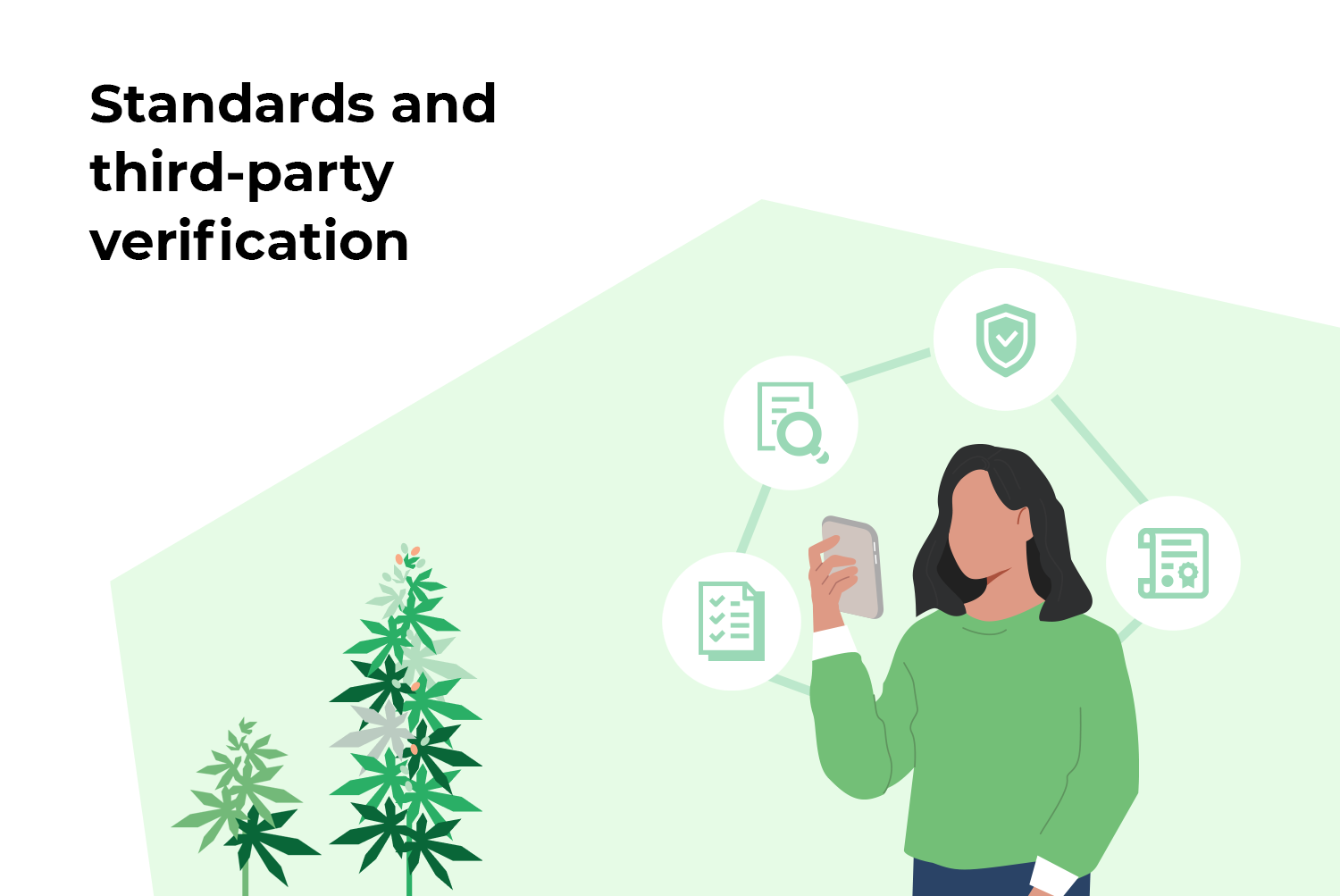
The information provided in this article is for general informational purposes only. While we endeavour to provide accurate and up-to-date information, there may be instances where information is outdated or incorrect. The contents of this article should not be taken as legal advice nor should it be relied upon in making any business, legal or other decisions. We encourage readers to consult with a qualified legal or professional advisor to obtain proper advice based on your unique circumstances. Cannavigia disclaims any liability for any loss or damage arising out of or in any manner connected with the use of or reliance on the information provided in this article.
Talking about standards, audits, certification and specifications is a bit like learning for an examination. You know you should be doing it and you know doing it will make you wiser, but you keep on putting it off because you don’t know where to start…and it’s sooo much information. Yet, as many rule-skippers, first time growers and other dodgers quickly find out: if you don’t stick to the rules your harvest may just stay in the warehouse forever and your investors may just be a little upset with you because they have not seen a return on their money.
This all means that growers should pay more attention to this issue because as we all know, you can’t bend a bureaucracy and working with them just makes life so much easier, plus not getting that required license also sucks. These standards and certification also play an important role in making sure that the industry is taken seriously and that the product on offer is safe and quantifiable.
So, as a service to you the reader, we decided to approach the industry guru, founding and board member of Global G.A.P, as well as Global Food Safety Initiative (GFSI) and Cannavigia advisor, Johann Zueblin to tell us how things work and why they should work.
He wrote us a piece explaining some stuff, but we had more questions. So, then we decided to add an interview with him to explain things even more clearly. After that we also picked the brain of Jan Kenel, Cannavigia Product Manager to see what role the software can play in making your life easier.

Part 1: Johann tells us…
Why standards and
third-party verification
make sense
Standards, audits and certifications are used in all sectors of the economy to prove that the requirements for the defined best practice are implemented. International agreements and especially ISO standards regulate all these processes. Accreditation of standards, audit and certification processes play a central role.
Standards define “best practice” and how these must be adhered to and verified. Whenever possible, these standards are created based on official legal requirements by the industry according to clearly defined (ISO) processes. Third party verification and audits check the defined specifications of the standards and attest compliance via an audit report and, where possible, a certificate.
The GACP standard applies to the cultivation of cannabis (pre-farm gate). As a rule, the specifications are verified according to a checklist by a third party (external specialist) and recorded in an audit report; GACP certification is not possible in this case. Increasingly, certification is now desired or required for this area as well. For such cases, the (private) standard of the international audit and certification company Control Union, which is the only one to date that covers GASP and GMP processes, can be applied.
For the cultivation of CBD hemp (pre-farm gate), the Global GAP standard can now also be used. Global GAP has the advantage that the area of food safety in the standards is recognized by the Global Food Safety Initiative (GFSI), which is particularly important for the area of novel food.
Reports and certificates that document compliance with the defined specifications are of central importance for buyers and end customers. Unfortunately, documents are often falsified, copied or issued without verification. For this reason, it is important that the entire value chain is made transparent and that all relevant information, including reports and certificates, is stored securely.
Part 2: We talk to Johann
…and he explains things more clearly
Why do standards, audits and certification make sense in any industry?
Standards are produced by industries to have a common language and a common understanding for what is needed. When you set up a standard everybody has to agree that they speak the same language and understand each other. We then look at the laws of the land and what is considered good practices. Once we have the common understanding, the ability to implement, how to control it and how to audit end certify it, we have created a standard. All these standards should be in line with the ISO norms.
How are these standards created?
We have two kinds of standards: those created by regulators and those of the industry. The standards of the regulator are related to the actual laws and regulations and often very basic, that of the private sector are more related to the practical implementation by respecting the regulations. In the case of the cannabis industry the standards that are being set goes beyond legislation because it has to be a useful tool for those who implement it. It needs the guidance as to how to perform as defined in line with the requirements of the standard. You start off by putting together a group of experts – lawyers, practitioners, engineers. You make sure that all role players are represented. They then define what is needed to create an accreditation. ISO clearly explains what the need as a broad outline is, but the details are determined by this crew of specialists.
With all the different applications of cannabis, there seems to be a jumble of acronyms that it has to adhere to. What is the difference between the GACP, GMP, Global GAP and GFSI?
The GACP is the good agriculture and collecting practices. This is a compact standard that allows verification of how crops are produced and collected whether it’s mushrooms or herbs. It consists of a checklist that is then audited by a specialist. It does not fall under the ISO-umbrella.
The GMP is the good manufacturing practice. It has nothing to do with food. It comes from the medical and pharmaceutical side. It is a standard on how to extract and produce medicine.
The Global GAP is an international standard for good agricultural practices for the whole agricultural sector, now including cannabis for the production of CBD. If you want to use these agricultural products in food, Global GAP is the only standard that covers the food safety part.
The GFSI is a global food safety initiative. It’s an organisation from the Consumer Good Forum and is based in Paris. They have developed a guidance document. This document is the basis for all the standards that are recognized by the industry.
All these requirements, certifications and audits leaves the door open for falsification and corruption. How broad is this practice and how can it be prevented?
If an accreditation body (AB) is part of a globally accredited organisation, there are constant checks and balances in place, so called peer reviews. This includes how they check the standard owners, how they check the auditors and the audit organisations and certification.
In the case of GlobalGAP (GG) we found some discrepancies and false certificates. We decided to setup an internal “Integrity Program”. Step by step all 113 CB’s worldwide with a GlobalGAP accreditation were controlled. 12 certification bodies lost their GG accreditation due to major nonconformities. Fortunately, the official accreditation bodies have adapted their approach. For the cannabis industry I would like to propose a similar approach. One positive list of certification bodies and auditors, based on a common developed assessment system. This may be a tricky situation when people start protesting about not being on the list if they have an official accreditation. We have to be on the safe side because we need to protect our young industry and the companies. We cannot afford to have unqualified people performing these important tasks. This needs to be discussed in the higher echelons of the industry as to how we are going to handle this. The second point is the falsification of documents. Currently Cannavigia has a timestamp system in place. Once a document is placed on the data base, it cannot be changed. But humans remain the soft factor. Because of the high number of businesses moving into cannabis, we need to address this issue very quickly. People can adhere to good agricultural practices but cannabis has certain requirements of its own that need to be covered. If you have five greenhouses, but you only want to certify one, that should not be possible. There is currently not one solid system in place. We had a request from one of the German states to personally go and check out a crop in Jamaica for certification. When we requested the same audit in another German state, there was no request like this. And that’s within the same country. The Cannabis industry has to develop and propose solutions, if we don’t do it, others will be happy to do it.

Part 3: This is the part…
where Cannavigia Product Manager, Jan Kenel tells us how Cannavigia can make your life easier
How can Cannavigia help to prevent falsification of documentation to make the results more trustworthy?
It is the manufacturer’s responsibility to prevent falsification, not of the software. To help them we do have a few checks and balances in place. Firstly, we can send out test examples to the laboratory. Then we have the time stamp where we can check when something was uploaded or if something was changed. So, once there is the suspicion of a wrong doing it is very easy to check. Once you have released the batch of product, you cannot change the data. And of course, the system will not allow you to release product that is not within the correct specifications.
There are a lot of standards out there that need to be adhered to. Which of them is Cannavigia suited to help with?
Basically, with Cannavigia you have everything documented and that can be adjusted and adapted to whatever requirements institutions want.
Our cultivation and manufacturing modules of the software are focused on GACP and GMP. We have already helped many companies pass GACP audits, and for GMP, our customers can do things like facility maintenance, batch release, item specification verification and more. We are constantly developing the software so that our customers have the best tool to comply with the standards.
We are at a point in the industry where the laws and the rules are changing every day. Is Cannavigia software compatible with these changes and can it keep up with the fast-changing laws?
We are a highly adaptable software. Our whole platform is designed to deal with quick changes. If you look at how the software was developed, you will see that it was always done in conjunction with industry leaders. This means that the manufacturers help us to help them with the standards and guidelines, continuously making sure that things are easy and simple to keep records. We are constantly adapting between the ideas coming from our clients and the ever changing landscape of rules.
How does Cannavigia as a company feel about all these rules and standards?
We are here to support all these rules and standards but at the same time we strive for vigilance beyond certification, meaning that full transparency creates a bridge between all different standards and lets you be compliant with all of them. This forms the cornerstone of safe products for the end consumer. Cannavigia supplies the manufacturer with all these tools to fulfill their obligations making sure that they have a high level of information that they are willing to share about their process.
Do you need help with standards, regulations and certifications? Look at our consulting services on how we can help you and contact us!
Comments